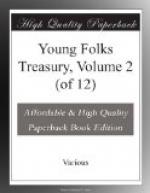“Ah, Oliver, why dost thou speak to me with so much anger and hate,” cried Roland sadly.
“Because it is thy fault that so many Franks lie dead this day,” answered Oliver. “It is thy folly that hath slain them. Hadst thou done as I prayed thee our master Charlemagne had been here. This battle had been fought and won. Marsil had been taken and slain. Thy madness it is, Roland, that hath wrought our fate. Henceforward we can serve Charlemagne never more. And now here endeth our loyal friendship. Oh, bitter the parting this night shall see.”
With terrible grief in his heart, stricken dumb with misery and pain, Roland gazed upon his friend. But Archbishop Turpin had heard the strife between the two, and setting spurs to his horse he rode swiftly towards them. “Sir Roland, and you, Sir Oliver,” he cried, “I pray you strive not thus. See! we all must die, and thy horn, Roland, can avail nothing now. Great Karl is too far and would return too late. Yet it were well to sound it. For the Emperor when he hears it will come to avenge our fall, and the heathen will not return joyously to their homes. When the Franks come, they will alight from their horses, they will find our bodies, and will bury them with mourning and with tears, so we shall rest in hallowed graves, and the beasts of the field shall not tear our bones asunder.”
“It is well said,” cried Roland.
Then to his lips he laid his horn, and taking a deep breath he blew mightily upon it. With all the strength left in his weary body he blew.
Full, and clear, and high the horn sounded. From mountain peak to mountain peak the note was echoed, till to the camp of Charlemagne, full thirty leagues away, it came.
Then as he heard it, sweet and faint, borne upon the summer wind, the Emperor drew rein, and bent his ear to listen. “Our men give battle; it is the horn of Roland,” he cried.
“Nay,” laughed Ganelon scornfully, “nay, Sire, had any man but thee said it I had deemed he lied.”
So slowly and sad at heart, with many a backward glance, the Emperor rode on.
Again Roland put his horn to his mouth. He was weary now and faint. Blood was upon his pale lips, the blue veins in his temples stood out like cords. Very mournfully he blew upon his horn, but the sound of it was carried far, very far, although it was so feeble and so low.
Again to the soft, sweet note Charlemagne bent his ear. Duke Naimes, too, and all the Frankish knights, paused at the sound. “It is the horn of Roland,” cried the Emperor, “and very surely had there been no battle, he had not sounded it.”
“There is no battle,” said Ganelon in fretful tones. “Thou art grown old and fearful. Thou talkest as a frightened child. Well thou knowest the pride of Roland, the strong, bold, great and boastful Roland, that God hath suffered so long upon His earth. For one hare Roland would sound his horn all day long. Doubtless now he laughs among his peers. And besides, who would dare to attack Roland? Who so bold? Of a truth there is none. Ride on, Sire, ride on. Why halt? Our fair land is still very far in front.”




